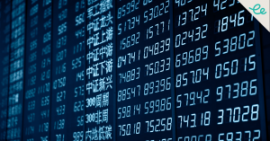When shares in an elevator company go limit up because it has the same name as a new adviser to Xi Jinping, there can be little doubt that China’s stock market is a casino. But that would be to jump to the wrong conclusion. True, the Chinese equity market is far from perfect and reform is piecemeal. But it is becoming more professional, less prone to heavy-handed micro-management by the Party-state and of growing interest to overseas equity investors. So here is our take on what foreign investors should know about China’s stock market if they invest in it.
Shanghai and Shenzhen Stock Exchanges
After a 40-year hiatus, the Shanghai and Shenzhen exchanges reopened in 1990. Today they list around 4,000 companies. State-owned enterprises long dominated the new listings, but in the past decade the two bourses have become a cradle for the sort of innovative technology companies that China is counting on to power the next stage of its economic development.
The ChiNext board in Shenzhen, which started in 2009, is home to about 1,000 such firms. Shanghai also lists tech names on its STAR market, which opened for trading in 2019, but Shenzhen has a sharper cutting edge and is gradually becoming China’s premier stock market.
How IPOs are priced
The distinguishing feature of China’s stock market is how initial public offerings (IPOs) are priced. Since 2014, the China Securities Regulatory Commission has in effect required companies to go public at no more than 23 times annual earnings per share.
The cap – which gave Chinese companies a big incentive to list overseas on higher valuations – typically produces a massive pop on the first day of trading. Some stocks jump several hundred percent – to the delight of retail investors who subscribe to IPOs through a lottery system. Hence, the casino reputation.
But change is afoot. China has begun to experiment with market-based pricing. Neither ChiNext nor STAR is subject to valuation ceilings, though that did not prevent one company’s shares from soaring more than 900% on its debut on STAR in June 2020.
In the same vein, regulators have relaxed profit and revenue requirements for ChiNext and STAR, which have also adopted a registration system for IPOs instead of requiring prior approval from the authorities. But the Party-state, ever wary of potential instability, remains attentive. What would have been a record-breaking $37 billion IPO by Ant Financial on STAR in November 2020 was blocked at the eleventh hour after comments by the firm’s founder, Jack Ma, angered the Party leadership.
Market forces versus government control
Regulators have certainly been attentive in the past during market sell-offs. When prices fell sharply in 2015 they suspended a swath of shares and ordered state-owned financial institutions to prop up the market. By contrast, during a milder sell-off in February and March 2021, they were conspicuously restrained. Any intervention was modest and had minimal impact.
China has also adopted more of a hands-off attitude to foreign capital. Thanks to new rules, institutional investors participating in the qualified foreign institutional investor (QFII) scheme no longer face any obstacles to buying and selling shares in China and can easily take their money out of the country.
QFII investors can borrow stock from brokers to sell short and they can hedge their positions using equity futures. Foreigners are now on a level playing field with domestic investors.
One thing that has not changed is the speculative nature of the Chinese market. A company praised or criticised on the evening news is sure to be actively traded the next day. Fundamentals matter less than in developed markets. Even for institutional investors, a buy-and-hold strategy is fraught with risk.
Trading structure and future reform
But China’s market structure largely insulates it from the stomach-churning roller-coaster ride that shares in US video store operator Gamestop went on in early 2021: day-trading is not possible in China; clients’ accounts have to be fully funded – a legacy of credit risk; and there are limits to how far a stock can rise or fall each day.
The overall picture, then, is of the Party-state cautiously embracing market mechanisms because it recognises the benefits of a well-functioning stock market. Xi Jinping wants better, more efficient companies, and opening the door to foreigners generates goodwill as well as capital inflows. That is not to say there will be no setbacks on the road to reform. This is China. Change must be on the terms of a Party that abhors instability and craves control. Just ask Jack Ma.
***
Related articles:
China launches Beijing Stock Exchange – https://blog2.enodoeconomics.com/2021/11/25/beijing-new-stock-exchange/
How China’s Stock Market Differs to the US – 3 Key Pointers – https://blog2.enodoeconomics.com/2021/03/09/how-chinas-stock-market-differs-to-the-us-3-key-pointers/






Comments are closed.